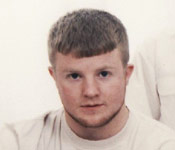A three-judge panel of the U.S. Court of Appeals for the 4th Circuit on Thursday unanimously upheld a lower court's decision to toss out the conviction and death sentence of a client of the University of Virginia School of Law's Innocence Project Clinic and pro bono attorneys with the law firm King & Spalding and the Virginia Capital Representation Resource Center.
The judges agreed with U.S. Judge Raymond A. Jackson's 2011 ruling that Northern Virginia man Justin Wolfe was wrongfully convicted of murder for hire in 2002. Wolfe and the victim, Daniel Petrole, were connected through a drug ring run by middle-class suburban youths. Jackson found that the Prince William County Commonwealth's Attorney's Office withheld exculpatory evidence from Wolfe's defense lawyers during the original trial.
"Every step has been a step toward the jail door opening for [Wolfe]," said Deirdre Enright, director of investigation for the Innocence Project Clinic. "It's a huge victory. The 4th Circuit agreed with Judge Jackson completely."
Wolfe, who remains on death row at Sussex I Prison in Waverly, Va., said through his attorneys that he is pleased with the ruling and eager to be released after more than a decade in prison.
Attorney General Ken Cuccinelli must now decide whether to appeal the three-judge panel's ruling to the U.S. Supreme Court, request a rehearing of the case by the full 4th Circuit Court of Appeals, or choose not to appeal.

If Cuccinelli opts not to appeal, the case would return to Prince William County Circuit Court, the same venue Judge Jackson said prosecutors would have to retry Wolfe if they did not release him within 120 days.
Matthew Engle, legal director of the Innocence Project Clinic, called Thursday's ruling a "huge relief."
"It's hugely rewarding to see that the 4th Circuit agreed with what we've been saying all along, which is that Justin never got a fair trial and that he was innocent of the murder he was charged with," he said.
Engle also said the three-judge panel's decision is "very, very strong" and would be "very difficult to reverse on appeal."
In the opinion, the judges highlighted a key piece of evidence that was withheld in Wolfe's case, but that came to light after Jackson ordered the Prince William County prosecutors to turn over all of its files in the case in response to requests from the clinic and Wolfe's attorneys.
The evidence, a written police report called the "Newsome report," documents a conversation between a police detective and Owen Barber — the triggerman. In that conversation, the detective advised Barber that he could avoid the death penalty by implicating Wolfe. Prior to that conversation, Barber had never asserted that Wolfe hired him to kill Petrole.
"The Newsome report is indubitably impeaching, in that it establishes a motive not only for Barber to implicate someone else, but to point the finger specifically at Wolfe," the judges wrote. "Indeed, it cannot be trivialized that — as Detective Newsome's own report demonstrates — Newsome fed Barber the crux of his testimony, i.e., that he was hired by Wolfe to murder Petrole. Put simply, the Newsome report is crucial, impeaching evidence that was 'unquestionably subject to disclosure under Brady.'"
Barber later recanted his original testimony that Wolfe hired him to kill Petrole.
Engle said the three-judge panel's decision was, in some respects, "alarming," as it cites a "pattern of conduct" by the Prince William County Commonwealth's Attorney's Office of withholding favorable evidence.
Engle added that the case underscores the need to reform Virginia's discovery rules.
In the panel's opinion, the judges note that the prosecutor in Wolfe's case does not turn over entire case files to defendants.
"During Wolfe's evidentiary hearing in the district court, the Commonwealth's Attorney explained that his office does not have an 'open-file policy,' providing criminal defense counsel access to entire case files," the judges wrote. "Asked to elaborate, he offered the flabbergasting explanation that he has 'found in the past when you have information that is given to certain counsel and certain defendants, they are able to fabricate a defense around what is provided.'"
Founded in 1819, the University of Virginia School of Law is the second-oldest continuously operating law school in the nation. Consistently ranked among the top law schools, Virginia is a world-renowned training ground for distinguished lawyers and public servants, instilling in them a commitment to leadership, integrity and community service.


